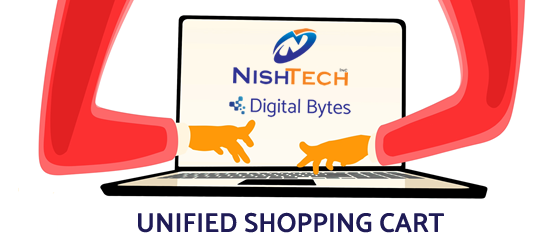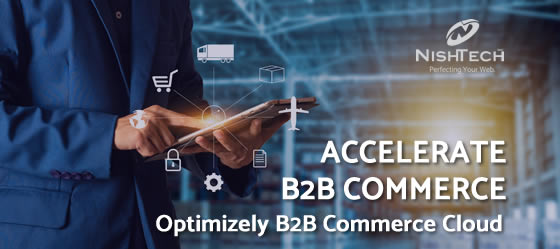8 Features of the Best B2B Ecommerce Platforms
written by Nishtech
|January 2025
In 2025, the line between B2B and B2C ecommerce experiences continues to blur. Today’s B2B buyers demand seamless, efficient, and personalized digital experiences—a standard set by their experiences as consumers. To remain competitive, B2B companies must prioritize exceptional customer experiences on their ecommerce platforms.
Research consistently shows that a superior customer experience directly impacts revenue and growth. A recent study by Forrester Research reveals that businesses focusing on customer experience outperform their competitors by as much as 80%. With this in mind, let’s explore the must-have features of the best B2B ecommerce platforms in 2025.
The Best B2B Ecommerce Platform Features
For many companies, launching an ecommerce platform is a major milestone, but building a site and populating it with products is just the beginning. To drive real success, your platform must deliver features that enhance the customer experience. Below are the essential features your platform should include:
Ease of Use
Modern buyers expect intuitive navigation and quick access to relevant information. Ensure your platform prioritizes:
1. Search Functionality: AI-powered predictive search, filters, and product hierarchies make finding items fast and easy.
2. Seamless Navigation: A clear, well-structured layout with a user-friendly footer.
3. Accessible Product Information: Incorporate a Product Information Manager (PIM) to ensure accurate and up-to-date details.
Pro Tip: Optimize the site for speed and mobile responsiveness, as slow-loading pages can cost you sales.
Advanced Content Support
Content drives purchases, especially for B2B buyers who often research extensively before making decisions. The best platforms support:
1. Dynamic Content Delivery: Use a digital experience platform (DXP) to personalize and manage content.
2. Rich Media: Incorporate 3D product visualizations, AR tools, and video tutorials to enhance understanding.
3. Comprehensive Resources: Offer downloadable product manuals, detailed FAQ pages, and interactive demos.
AI-Driven Chatbots
Chatbots have evolved into sophisticated tools that drive engagement and sales. In 2025, the best chatbots:
1. Provide multilingual support to cater to global audiences.
2. Handle complex inquiries with AI-powered natural language processing.
3. Screen prospects and seamlessly transition them to sales reps for more detailed conversations.
Did You Know? Businesses using chatbots see up to a 90% increase in customer engagement and a 67% boost in sales.
Real-Time Order Tracking
Order tracking is no longer a luxury but a necessity. Customers expect real-time updates on their shipments. Your platform should:
1. Provide live status updates from warehouse to delivery.
2. Offer proactive notifications for delays or changes.
3. Include a self-service portal for tracking and managing orders.
Omnichannel Push Notifications
Push notifications keep your brand top of mind and boost customer retention. In 2025, omnichannel strategies—web push, SMS, and in-app messaging—are essential. Ensure notifications:
1 Deliver personalized updates, like order confirmations or promotional alerts.
2. Avoid being overly intrusive to maintain user trust.
3. Are easy to opt into or out of.
Did You Know? Downtown like the morning, evening, and weekends are the times when people are happiest to receive push notifications?
Digital Coupons and Discount Codes
Even in B2B, buyers are drawn to deals. Offer flexible discounting options, such as:
1. Volume-based discounts for large purchases.
2. Seasonal promotions or loyalty rewards.
3. Expiring coupon codes to create urgency.
Pro Tip: Integrate your promotions with your CRM to track which customers engage most with discounts.
Collaborative Tools (List Creation)
B2B purchases often involve multiple stakeholders. Help your customers by enabling:
1. Saved Lists: Allow users to save and share product lists for team review.
2. Collaboration Tools: Add functionality for leaving notes or tagging colleagues.
3. Multi-User Accounts: Provide account hierarchies where team members can collaborate and purchase within budget approvals.
CRM and DXP Integration
A great ecommerce platform connects seamlessly with customer relationship management (CRM) tools and digital experience platforms (DXPs). These integrations enable:
1. Personalization: Use purchase history and customer data to tailor site content and recommend products.
2. Automation: Streamline processes like reorders, reminders, and loyalty rewards.
3. Insights: Leverage AI to analyze customer behaviors and optimize the experience.
Pro Tip: Consider platforms like Sitecore, Optimizely, and Salesforce Commerce Cloud for robust integrations.
Your Strategy for B2B Ecommerce Success
Building or upgrading a B2B ecommerce platform involves countless moving parts. From ensuring the right features are in place to delivering a polished customer experience, the process can be overwhelming. Many companies struggle to meet their goals due to lack of expertise or resources.
Working with a knowledgeable partner can simplify the journey. Whether you need support with specific features or full project management, a consultant can bridge the gaps and bring your vision to life.
Remember: Companies that focus on exceptional customer experiences achieve better retention and higher revenues. A tailored ecommerce strategy will differentiate your brand in an increasingly competitive market.
Need help optimizing your B2B ecommerce platform? Let’s discuss how our team can help you build an experience that meets the demands of 2025’s buyers.



